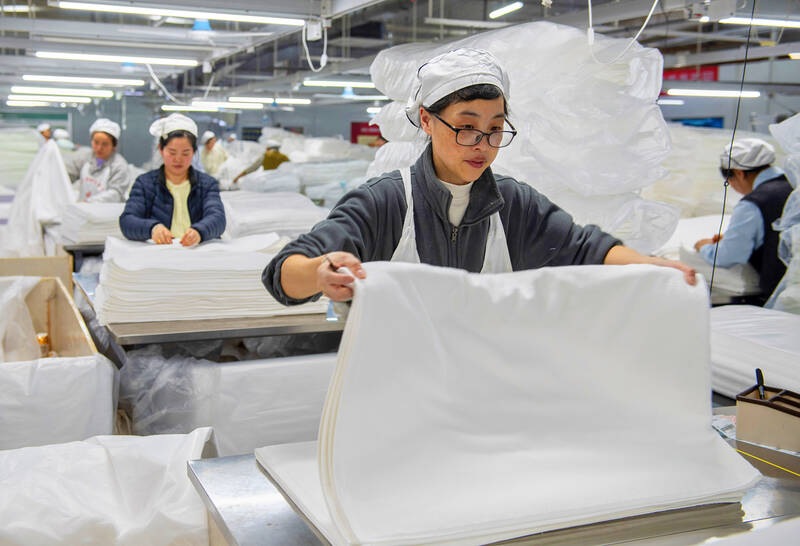China yesterday announced additional tariffs of 34 percent on US goods, the most serious escalation in a trade war with US President Donald Trump that has fed fears of a recession and triggered a global stock market rout.
Beijing also announced it was adding several US entities to an export control list and classifying others as “unreliable” entities.
Nations from Canada to China have readied retaliation in an escalating trade war after Trump raised US tariff barriers to their highest level in more than a century this week, leading to a plunge on global financial markets.

Photo: Chinatopix via AP
In Tokyo, one of top trading partners of the US, Japanese Prime Minister Shigeru Ishiba said that the tariffs had created a “national crisis” as a plunge in banking shares set the stock market on course for its worst week in years.
Investment bank JP Morgan said it now sees a 60 percent chance of the global economy entering recession by the end of this year, up from 40 percent previously.
With European shares also heading for the biggest weekly loss in three years, EU Commissioner for Trade and Economic Security Maros Sefcovic was yesterday speak to his counterparts in the US.
“The EU will respond in a calm, carefully phased, and above all, unified way, as we calibrate our response,” he wrote on social media. “We will not shoot from the hip — we want to give negotiations every chance to succeed to find a fair deal, to the benefit of both sides.”
The EU is divided on how best to respond to Trump’s tariffs, including on the use of its “Anti-Coercion Instrument,” which allows the bloc to retaliate against nations that put economic pressure on EU members to change their policies.
Nations that are cautious about retaliating and thereby raising the stakes in the standoff with the US include Ireland, Italy, Poland and Scandinavian nations.
The European Commission is nevertheless trying to finalize a list of 26 billion euros (US$29 billion) of US imports on which to place retaliatory tariffs in response to US tariffs on steel and aluminum.
French President Emmanuel Macron led the charge on Thursday by calling on companies to freeze investment in the US.
“Investments to come or investments announced in recent weeks should be suspended until things are clarified with the United States,” Macron said at a meeting with French industry representatives.
However, French Minister of Economics and Finance Eric Lombard later cautioned against like-for-like countermeasures on the US tariffs, warning that this would also rebound on European consumers.
“We are working on a package of responses that can go well beyond tariffs, in order, once again, to bring the US to the negotiating table and reach a fair agreement,” Lombard said in an interview with broadcaster BFM TV.

MULTIFACETED: A task force has analyzed possible scenarios and created responses to assist domestic industries in dealing with US tariffs, the economics minister said The Executive Yuan is tomorrow to announce countermeasures to US President Donald Trump’s planned reciprocal tariffs, although the details of the plan would not be made public until Monday next week, Minister of Economic Affairs J.W. Kuo (郭智輝) said yesterday. The Cabinet established an economic and trade task force in November last year to deal with US trade and tariff related issues, Kuo told reporters outside the legislature in Taipei. The task force has been analyzing and evaluating all kinds of scenarios to identify suitable responses and determine how best to assist domestic industries in managing the effects of Trump’s tariffs, he

In a small town in Paraguay, a showdown is brewing between traditional producers of yerba mate, a bitter herbal tea popular across South America, and miners of a shinier treasure: gold. A rush for the precious metal is pitting mate growers and indigenous groups against the expanding operations of small-scale miners who, until recently, were their neighbors, not nemeses. “They [the miners] have destroyed everything... The canals, springs, swamps,” said Vidal Britez, president of the Yerba Mate Producers’ Association of the town of Paso Yobai, about 210km east of capital Asuncion. “You can see the pollution from the dead fish.

TIGHT-LIPPED: UMC said it had no merger plans at the moment, after Nikkei Asia reported that the firm and GlobalFoundries were considering restarting merger talks United Microelectronics Corp (UMC, 聯電), the world’s No. 4 contract chipmaker, yesterday launched a new US$5 billion 12-inch chip factory in Singapore as part of its latest effort to diversify its manufacturing footprint amid growing geopolitical risks. The new factory, adjacent to UMC’s existing Singapore fab in the Pasir Res Wafer Fab Park, is scheduled to enter volume production next year, utilizing mature 22-nanometer and 28-nanometer process technologies, UMC said in a statement. The company plans to invest US$5 billion during the first phase of the new fab, which would have an installed capacity of 30,000 12-inch wafers per month, it said. The

Taiwan’s official purchasing managers’ index (PMI) last month rose 0.2 percentage points to 54.2, in a second consecutive month of expansion, thanks to front-loading demand intended to avoid potential US tariff hikes, the Chung-Hua Institution for Economic Research (CIER, 中華經濟研究院) said yesterday. While short-term demand appeared robust, uncertainties rose due to US President Donald Trump’s unpredictable trade policy, CIER president Lien Hsien-ming (連賢明) told a news conference in Taipei. Taiwan’s economy this year would be characterized by high-level fluctuations and the volatility would be wilder than most expect, Lien said Demand for electronics, particularly semiconductors, continues to benefit from US technology giants’ effort